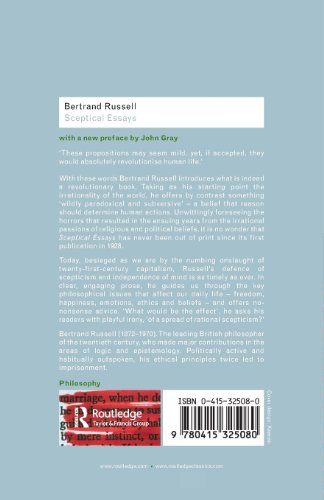Customer Services
Copyright © 2025 Desertcart Holdings Limited




Sceptical Essays (Routledge Classics)
L**T
We must be sceptical even of our scepticism
In these brilliant essays, B. Russell unmasks idealism, `good' men (`The Harm that good men do'), behaviorism and `sinister interests' (power and wealth). He exposes Marx's ambiguities and Bentham's subversion and clarifies his vision on freedom, free thought, education, politics, science and the place of mankind in the universe.Idealism and HegelFor B. Russell, idealism is a desperate attempt to keep mankind at the heart of the universe: `When the earth lost its central position, man too was deposed from his eminence. It became necessary to invent a metaphysic to correct the crudities of science. This task was achieved by the `idealists', who maintain that the world of matter is an unreal appearance. `Absolute' reality is Mind or Spirit'!Jeremy BenthamB. Russell shows that J. Bentham's philosophy is profoundly subversive, because the latter defined a `good' man as a man who does good and as a man whose activities and opinions are not pleasing to the holders of power.Freedom and free thoughtFor B. Russell, `the bare minimum of freedom - food, drink, health, housing, clothing, sex and parenthood - should override any other claim.'Thought is free when it is exposed to free competition among beliefs.On educationThe ideal of an all-round education is out of date, because it has been destroyed by the progress of knowledge.On MarxMarx proves conclusively that under capitalism wage-earners have suffered terrible privatizations. He does not (attempt to) prove that they will suffer less under communism.On behaviorism (Dr. Watson)For Dr. Watson, one of the most important elements in the judging of personality, character and ability is the history of the individual's yearly achievements and the yearly increases he received in his earnings! Russell asks: what about Jesus Christ, Buddha ...?Man seen from the outside`Our planet is a microscopic dot in the visible world. On this dot, tiny lumps of impure carbon and water (men) crawl about for a few years. They divide their time between labor designed to postpone the moment of dissolution for themselves and frantic struggles to hasten it for others of their kind. Natural convulsions and disease periodically destroy millions of them. These events are considered to be misfortunes; but when men succeed in inflicting similar destruction by their own efforts, they rejoice and give thanks to God.'These frank, sarcastic and unambiguous essays are a must read for all those who love philosophy and who want to understand the universe we live in.
Trustpilot
3 weeks ago
2 months ago